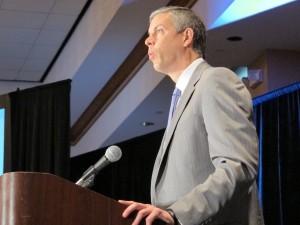US Secretary Of Education Opposes School Vouchers In Indiana, Supports 'Good' Charter Schools

Kyle Stokes/StateImpact Indiana
U.S. Secretary of Education Arne Duncan speaks in Gary earlier this year.
US Secretary Of Education Arne Duncan told Lakeshore Public Broadcasting’s Steve Walsh that he disagrees with efforts in Indiana to expand school voucher options in the state. Duncan argues the state needs to emphasize strong public school options including high quality charter schools, rather than subsidizing private schools.
“On the school vouchers question, the governor and I have absolutely agreed to disagree on that issue,” Duncan told Walsh Thursday.
- Lakeshore Public Broadcasting Interview With Arne DuncanSecretary of Education Opposes School VouchersDownload
“I’m not a fan of charter schools, I’m a fan of good charter school,” Duncan said. He went on to say that he believes strong accountability standards must be tied to any discussion of expanding charter school options.
“You have to have a really high bar when you look at who can start a charter school,” Duncan said. “This cannot be let a thousand flowers bloom. You must to look at their track record other places and you have to hold them accountable.”
Duncan complimented Indiana Superintendent Tony Bennett on the state’s takeover of several schools in the Indianapolis and Gary areas. He called the effort brave.
“It’s tough work. It’s hard. It’s controversial,” Duncan said. “But for the first time we are not condemning these children to a life of poverty and failure.”
Duncan has been a controversial figure within the education community for his support of a platform which emphasizes certain school choice and teacher accountability measures. These positions have often brought the former Chicago Public Schools Superintendent to loggerheads with many of the nation’s biggest teachers unions. Recently, Karen Lewis, head of the Chicago Teacher’s Union attacked Duncan on the grounds that he attended a private school growing up. According to the Chicago Tribune those remarks turned rather personal with Lewis going as far as to attack the way that Duncan speaks.
At a union event in Seattle last month, Karen Lewis said she could tell Duncan “went to a private school, because if he had gone to a public school, he would have had that lisp fixed.”
Lewis later apologized for the remarks, but this kind of heated dialogue has defined much of the conversation between Duncan and teachers unions.
At the root of the disagreement is Duncan’s decisions to back efforts to pay teachers based on student performance. Indiana adopted a mandatory pay for performance law during the last legislative session. The legislations requires schools to implement an evaluation system for all teachers. It also eliminates several traditional means of determining teacher pay including bonuses for advanced degrees and automatic pay increases based on years of service.
For comparison, the American Federation of Teachers argued in a report issued in 2008 that compensation is best negotiated between district officials and local teachers unions. The report cited several major objections to tying teacher evaluations to standardized test scores, including concerns that such a system would penalize teachers assigned to the most difficult classrooms. The group also argues that such a system would incentivize so called “teaching to the test.” In other words, teachers would tailor their course work towards ensuring students pass the standardized test, rather than providing a comprehensive education.
Podcast: Play in new window | Download

